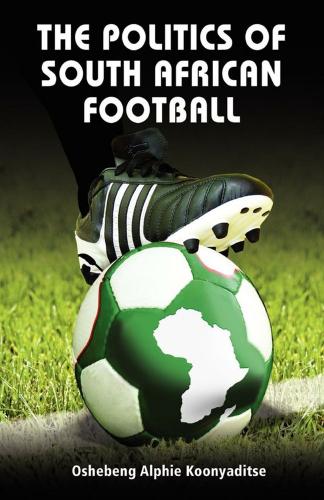The politics of South African football
The politics of South African football
Oshebeng Alpheus Koonyaditse
African Perspectives Publishing PO Box 95342 | Grant Park 2051 | South Africa www.africanperspectives.co.za
© Oshebeng Alpheus Koonyaditse 2010
All rights reserved. No part of this publication may be reproduced, stored in a retrieval system or transmitted in any form or by any means, electronic, mechanical, photocopying or otherwise, without the prior written permission of the author.
ISBN 978-0-981-43982-2
Edited by Mindy Stanford
Typeset by Gail Day
Cover design by Mycalture
Printed and bound by 4 Colour Print
contents
about the author
acknowledgements
foreword
chapter one
chapter two
chapter three
chapter four
chapter five
chapter six
chapter seven
chapter eight
chapter nine
chapter ten
chapter eleven
chapter twelve
chapter thirteen
chapter fourteen
chapter fifteen
chapter sixteen
chapter seventeen
chapter eighteen
chapter nineteen
chapter twenty
chapter twenty-one
chapter twenty-two
trivia quiz
references
Alphie Koonyaditse: “Never abandon your dreams”
Coming from a non-descript village called Cokonyane in remote Taung, Oshebeng Alphie Koonyaditse’s future did not seem promising. But his parents and maternal grandmother gave him a solid education in self-belief, and a deeply felt sense of right and wrong.
Alphie absorbed their simple humanity and innate wisdom.
Later, when he became one of South Africa’s leading sports journalists, these values translated into journalistic independence, an aversion to dishonesty and a determination to reflect the truth. “The history of this country has not always been accurately reported,” he points out. “People tend to forget the powerful role which sport, and football in particular, played in getting us where we are today as a nation.”
Alphie’s voracious appetite to learn, first led him to the Common-wealth Broadcasting Association, where he obtained a Certificate in Journalism, and then to further studies, culminating in an MBA at North West University. From there he moved to Radio Mmabatho where he became a radio presenter, newsreader, reporter and sports commentator. Awards followed in his wake: Commentator of the Tournament for the 1996 Africa Cup of Nations, ranked third best commentator of the 1998 World Cup, and a PSL Merit Award for the 2003/4 season. The recognition, far from going to his head, simply spurred him on to greater achievements.
Wherever there was access to knowledge he plunged right in, reading, reading, and reading – everything he could lay his hands on. At Radio Mmabatho Alphie first tasted the addiction of football. Fascinated by the intricacies of the game it wasn’t long before he was delving into the history of football in South Africa.
Always an avid reader, Alphie had long dreamt of writing a book, but thought it was “an impossible dream.” But as with any endeavour that has its roots in sincerity and passion, it soon began to take shape. It started as a series of articles, then it was going to be a documentary film, then gradually it formed itself into this book.
Alphie’s natural charisma and genuine interest gives all those he meets an instinctive trust in him and his goals.
His gaze is fixed on the far horizon. First, more studies – a PhD beckons. And then, who knows? There is still much to expect from this sparkling talent.
Hendrina Westoll
In researching this book I have had the benefit of assistance, cooperation and goodwill from many people. To all of you I express my profound thanks.
Sincere thanks to Professor Lesole Gadinabokao, Dr Peter Alegi, Mark Gleeson, Peter Raath, Timothy Molobi, S’Busiso Mseleku, Patrick Baloyi, Andrew Jennings, Marks Maponyane, Mathews Mpete, Lester Mpolokeng, Julian Drew, Dr Jacob Manonyane and my mentor, Cebo Manyaapelo – all of whom responded generously to my many questions and helped me put certain facts straight.
To my friend Dr Alejandro Rodón, who never got tired of my questions and queries, I am indebted for World Cup statistics.
Many thanks to Maluti Obuseng and Lesego Seswai who helped transcribe some of the interviews I conducted. I’m also deeply grateful to many other people who willingly gave me indirect assistance.
I’m pleased to express my gratitude to my publisher, Ms Rose Francis, and equally meriting my sincere thanks is my editor, Mindy Stanford, whom I often had to call at inconvenient hours and who never once complained.
A special thanks to my family who sacrificed much, complained little and offered genuine support while I worked late into the night and put them to great inconvenience. Thanks! In my mother tongue Setswana: le ka moso! – even tomorrow continue to offer me help.
Oshebeng Alphie Koonyaditse
While there are plenty of anecdotes about South African soccer – some hilarious, some sad and others bordering on the absurd – very little of this has been recorded, either in print or motion pictures. The wizardry of Kaizer “Chincha Guluva” Motaung, Cedric “Sugar Ray” Xulu, Ernest “Pro” Ramohai, Sly Mthimunye and others was never captured on film, since television only arrived in South Africa in 1975.
Those soccer followers who are now long in the tooth might want to know why I mention players from the seventies and don’t go even further back to the likes of Difference “City” Mbanya, Herbert “Shordex” Zungu and Stephen “Kalamazoo” Mokone. Kalamazoo went on to dazzle European crowds with his silky ball skills learned in the streets of Selbourne and by bouncing a tennis ball on his bedroom wall. The generation before included Darius Dhlomo, who ended up in Holland, and Albert “Hurry Hurry” Johansen, whose football prowess attracted the English club Leeds United.
It is with this backdrop that Oshebeng Alpheus Koonyaditse’s book is a more than welcome addition to the small clutch of printed works on South African football, which has such a rich history.
Having carved a niche for himself through his incisive and informative soccer shows on Motsweding FM, Koonyaditse’s passion for research comes out clearly on this book.
He
